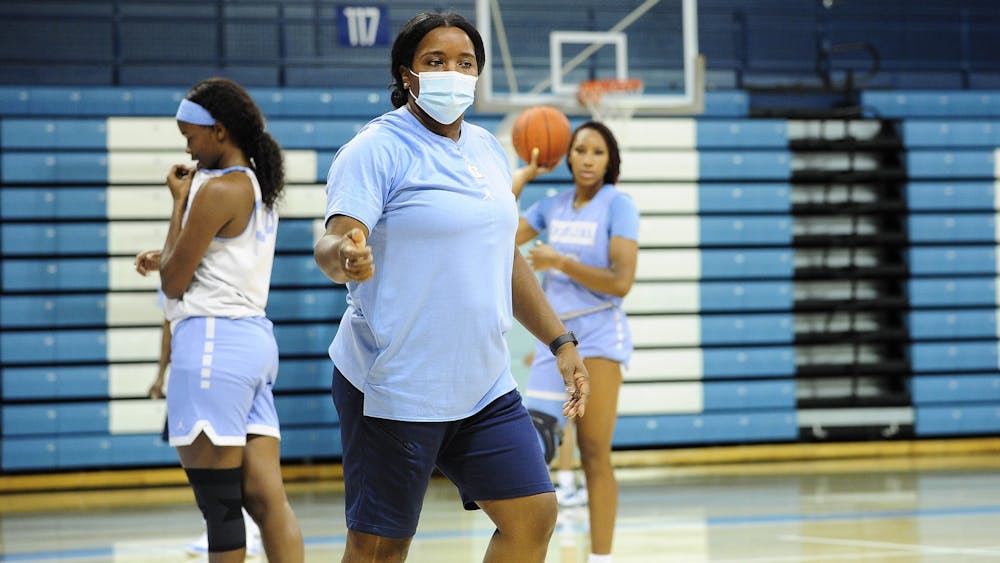Aluka-White entered high school as a raw talent. Someone with the athletic gifts to hold her own against elite prep players, but with only a couple of years of middle school basketball serving as refinement.
But Lofton saw the potential the rising ninth grader possessed and talked to his star player, Coleman. Then a junior, Coleman would go on to an illustrious playing career, being named All-ACC three times in college and developing into a WNBA standout. Simply put, Aluka-White was in good hands.
“Early on (when I'd suggest we play pick-up games), she’d be like, ‘Ugh,’ but then it became natural," Coleman said. "The more we went and the more we played, it was a good thing.”
Beyond the basketball-obsessed trait the pair possessed, they bonded over another shared identity: their Nigerian heritage.
Coleman was born in Washington, D.C., but her father was Nigerian. He died when Coleman was young, meaning she never spent much time with the Nigerian side of her family. Going to the Aluka household served as an opportunity for Coleman to step into that world.
“When I would go to her house, I mean the food that they would make, the languages, I would say that was just another thing that we had in common,” Coleman said.
As Aluka-White’s high school career progressed, she started getting recognized by college coaches. Deciding from a list of schools that included Houston, East Tennessee and South Carolina State, she chose Middle Tennessee State.
“(My parents) realized that this was something serious with me and something where I could go to school and have my education paid for," she said. "Which, at the end of the day, is really all they cared about.”
‘A sense of pride’
Aluka-White’s playing career came to a head at the 2004 Olympics in Athens, Greece. Holding dual-citizenship status, she was able to play for the Nigerian national team.
One name on the roster was a familiar one for Aluka-White: Itoro Coleman. Years after they had last taken the court together, they had a chance to represent the country where they both had their roots.
And represent Nigeria they did.
To get the day's news and headlines in your inbox each morning, sign up for our email newsletters.
Nigeria's women’s team had never won an Olympic game entering Athens. But with a win over South Korea, Aluka-White and Coleman’s squad became the first to ever do it.
“You would’ve thought we won the gold medal,” Coleman said. “You had a sense of pride just playing for your country.”
Not long after the Olympics finished, Aluka-White was dealt a blow back in the United States. Her father, John, died from a long bout with kidney issues. With his condition worsening, she left to go home before the closing ceremonies.
“I think there was a sense of pride that his daughter that was born here still had a sense of pride in the country that he came from and that I'm from as well,” Aluka-White said. “I went and represented Nigeria with a lot of pride, so I think before he died, he was proud of me and he cherished that.”
‘Helping young people’
Beyond the dominant force Aluka-White became on the court during her college career at Middle Tennessee State — finishing with over 1,000 career points and leading the Blue Raiders to an NCAA Tournament bid — she displayed the leadership traits that would eventually guide her into coaching.
Being named a team captain, the coaching staff relied on her as a stable presence within the program, someone who could guide recruits through official visits and hold her teammates accountable.
And this newfound leadership role came naturally to her. Growing up with John, a college professor and primary voice of reason within their family, she didn’t have to look far for an example of a leader.
“My dad was always a strong voice, he was always a problem-solver,” Aluka-White said. “I think I saw that and emulated that. Going into college, I was always able to be a voice of reason.”
After her playing career ended following a stint of professional basketball overseas, Aluka-White returned to the United States unsure about her next step. She needed work, so she called Stephany Smith, her former coach at Middle Tennessee. Smith told Aluka-White about a job opening at FIU, and as she tells it, “the rest is history.”
“Once I got to FIU, I really fell in love with helping young people get better, on and off the court,” Aluka-White said. “Just them growing as a young woman in those four years."
Despite her career spanning 15 years, Aluka-White hasn’t moved around much. She spent 2006-2012 at Florida International and followed that up with another seven years on staff at UNC-Charlotte, where she served as an associate head coach in her final two seasons.
Banghart said much of Aluka-White’s success as a coach comes from her ability to form unique one-on-one relationships with athletes.
“She’s someone who will have your back whether you’re a player or a coach,” Banghart said. “You always feel better when you feel like you’re trusted and when you feel like you’re supported. She does a really good job of that.”
Now in her ninth year in North Carolina and her second at UNC, Aluka-White is a well-respected name across the state. The potential for a head coaching position is there, but there’s no rush for that. One of Aluka-White’s mottos is blooming where she’s planted.
And right now, her roots are in Chapel Hill.
"I was able to see this place from afar and see the power of Carolina," Aluka-White said. "We all respect each other, we're hardworking people and we're trying to turn this program around, which we're doing."
@zachycrain
@dthsports | sports@dailytarheel.com




